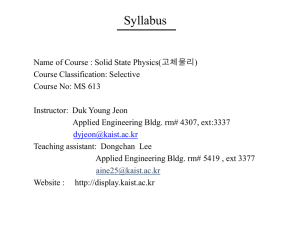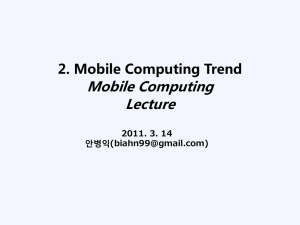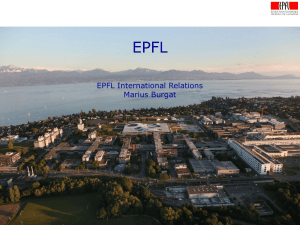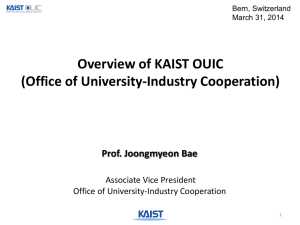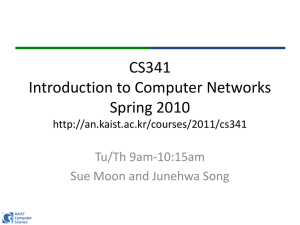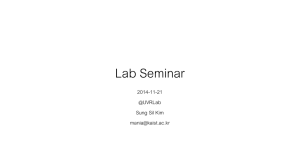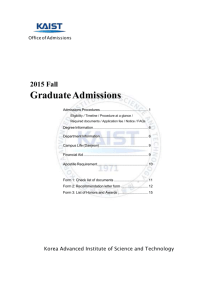KAIST Research Oriented Univ.
advertisement
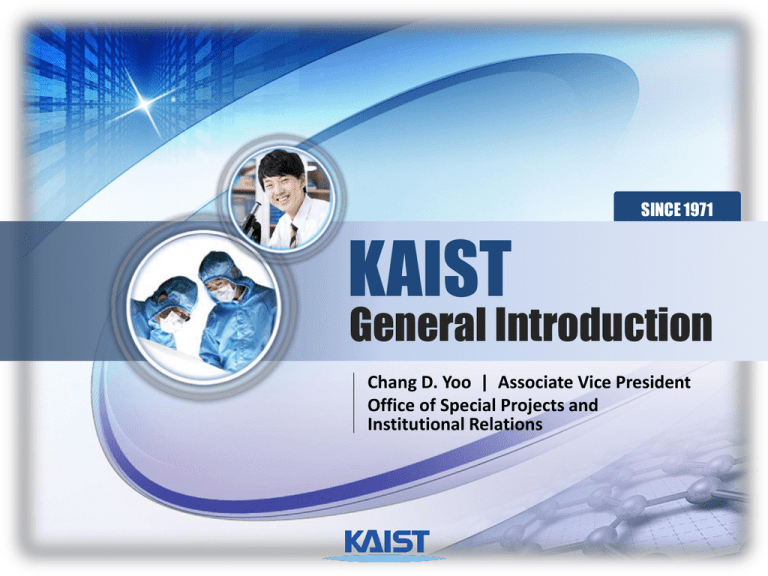
SINCE 1971 KAIST General Introduction Chang D. Yoo | Associate Vice President Office of Special Projects and Institutional Relations Introduction to KAIST and Daedeok Innopolis Geographical Location_ Republic of Korea • Unitary Presidential Constitutional Republic • Population: 50,004,000 • GDP: USD $1.156 trillion 38th parallel Introduction to KAIST and Daedeok Innopolis Geographical Location_ 1971 KAIS, Korea Advanced Institute of Science Grad. School ested in Seoul by the gov’t under a special law that guarantees special privileges such as exemption from compulsory military service KAIST Business KAIS School 1984 KIT, Korea Institute of Technology Undergrad. school est. in Daejeon by gov’t for students gifted in · Guseong Main Campus maths and sciences KAIST Main Campus, KIT Daejeon · Munji ICC Campus 1989 KAIST, Korea Advanced Institute of Science and Technology - Established through the merging of KAIS and KIT Introduction to KAIST and Daedeok Innopolis • Daedeok Innopolis: R&D Special Zone_ Geographical Location_ - 15% of National R&D Spending th 2) (Daejeon: 5 largest Metropolis, 540km - 11% of National Ph.D-level Researchers (App. 9,000) - Korea’s Silicon Valley Status (2011) KAIST Business KAIS School Sejong City : (465 km2) Korea’s new administrative capital 30 5 48,057 GRIs Universities Patents (Accumulated 39,052 Domestic, 9,005 Int’l) Daedeok Innopolis JUL 2005 (70.4km2) ISBB : Cheonan – Sejong – Chungwon – Daejeon 24,434 1,179 Researchers Companies (9,005 Ph.Ds) · Guseong Main Campus 15.5 Total Sales (Billion USD) ※ GRI : Government Research Institute KAIST Main Campus, KIT Daejeon • International Science - Business · Munji ICC Campus Belt (ISBB)_ World Class Science-Business Cluster Daegu Innopolis (Cheonan – Sejong – Chungwon - Daejeon) JAN 2011 (22.25km2) Gwangju Innopolis JAN 2011 (18.73km2) OBJECTIVE To develop the foundation for the development of a world class innovation cluster based on science PROJECT PERIOD /TOTAL BUDGET 1st stage : 2012-2017(6 yrs*), USD 4.5billion *Before the end of stage 1 of the project, the next stage will be planned. PROJECT DETAILS 1) 2) 3) Establish a world-class Basic Science Institute Install a heavy ion accelerator Lay the business foundation for the sustainable and urban growth Introduction to KAIST and Daedeok Innopolis Geographical Location_ SIZE (Daejeon: 5th largest Metropolis, 540km2) Korea Research Institute of Bioscience and Biotechnology Science Town (27.8km2) Techno-Valley (4.3km2) Industrial Area (3.2km2) Green Zone (31.2km2) Korea Atomic Energy Research Institute Defense R&D (3.9km2) Total (70.4km2) KAIST Business KAIS School Sejong City : (465 km2) Korea’s new administrative IV capital Daedeok Innopolis ISBB : Cheonan – Sejong – Chungwon – Daejeon Korea Aerospace Research Institute III JUL 2005 (70.4km2) · Guseong Main Campus KAIST Main Campus, KIT Daejeon II V · Munji ICC Campus Daegu Innopolis JAN 2011 (22.25km2) Gwangju Innopolis I Electronics and Telecommunications Research Institute KAIST ICC (Munji) JAN 2011 (18.73km2) KAIST Main Campus (Guseong) Korea Institute of Geoscience and Mineral Resources Agency for Defense Development Introduction to KAIST - Goal Global S&T Leaders in Research, Education and Entrepreneurship for Humanity Teamwork Diversity Integrity Respect Equity Creativity Introduction to KAIST • • • • Established in 1971 as the nation’s first graduate school specializing in science and engineering Merged with KIT and KAIST The KAIST main campus transferred to Daejeon in 1989 Bilingual Campus Faculty & Staff (1,588) Students (9,746) Budget (751 Million USD) 2,133 (21%) 469 (29.5%) 19% 22% 4,710 (45%) 2,529 (24%) 1,119 (70.5%) 1,024 (10%) 59% Ph.D. Faculty BS Staff M.S. –Ph.D. Integrated degree program MS Government Subsidy Research Grants Donations & other income Introduction to KAIST 2013 Asian University Rankings : 6th 2013 Top 50 Under 50 : 4th 2012 World University Rankings : 63rd - 24th in Engineering & IT - 48th in Natural Sciences 2013 Top 100 Under 50 : 3rd 2012 World University Rankings : 68th - 44th in Engineering & IT - 361 collaborative agreements in 59 countries. - 26 joint international research projects in 7 countries. - About 200 foreign faculty members from 27 countries. - 700 international students from more than 70 countries. KAIST Research Strategies and Achievements • KAIST was selected for the ‘2012 Thomson Reuters Top 100 Global Innovators’ award • KAIST is one of only two universities selected by Thomson Reuters for this prestigious award Ranked 5th: University PCT Filers in 2011 TOP 5 Univ. in US Computer Science Electrical Eng. Industial & systems Aerospace KAIST Nuclear&Quantum * PCT(Patent Cooperation Treaty) Yearly Review : The International Patent System in 2011 materials Eng. KAIST Chemical & Bio Johns Univ. of Texas System Hopkins Mechanical Eng. MIT Civil Eng. Univ. of California Comparison of JIF (Journal Impact Factor) in 2011 KAIST Research Strategies and Achievements KAIST Institutes (KI)_ KAIST Research Strategies and Achievements KAIST Research: HRHR_ / Online Electric Vehicle Project (OLEV) The OLEV has pick-up devices underneath the vehicle to wirelessly gather power and charge the battery from underground power supply lines through the non-contact, electromagnetic charging method Breakthrough Research for Battery & Charging Obstacles in Existing Electric Vehicles Main Achievements Patents : 178 (International: 63) KAIST Research Strategies and Achievements KAIST Research: HRHR_ / Mobile Harbor (MH) Novel maritime container transport system that can go out to an anchored ship on the open seas to load or unload containers regardless of water depth The Mobile Harbor Project aims to deal with recent market needs in marine cargo transportation, while staying economically and environmentally friendly. Main Achievements • Patents : 178 (International 27) • Papers : 92 (International 36) Saudi ARAMCO-KAIST CO2 Management Center • KAIST and Saudi Aramco, the national oil company of Saudi Arabia had a opening ceremony of the Saudi Aramco-KAIST CO2 Management Center on Feb. 20th, 2013. • The CO2 Management Center will be responsible for CO2 application research, converting CO2 into the energy source of the future. Creative and Effective Education 3. 0 Programs at KAIST • Innovative educational practices through group discussions, interactive learning, and creative education solutions through online and offline resources • • Global, Cyber Dual-Degree Program with the Technical University of Denmark (DTU) Chairwoman S.Y. Lee donated 7 million USD for KAIST’s innovative education programs in September of 2012 2013 International Presidential Forum on Global Research Universities(IPFGRU) http://forum.kaist.ac.kr 2013 International Presidential Forum on Global Research Universities • Theme l The Role and Responsibilities of Research Universities: Knowledge Creation, Technology Transfer, and Entrepreneurship • Date l October 15, 2013 • Venue l Westin Chosun Hotel, Seoul, Korea KAIST Business Incubation Technology Business Incubation Center Selected as the best business incubation center by AABI* in 2007 469 Venture Incubations (as of 2011) The first, largest Incubation Center in Korea Acceleration Program: systematic support devoted in assisting student ventures was established in 2010 45개 45 Rise in the number of 학생창업증가 * ‘06 ~ ‘09 : No subsidies Student Start-Ups 2 2006 2012 KAIST Student Venture – i-KAIST KAIST Co. developing IT based interactive educational soln. Multi-touch point screen technology, touchbar beam projector KAIST Research Strategies and Achievements Startup Venture Business - A KAIST student is a co-founder of Ticket Monster Co. - Ranked 1st in domestic social commerce - Achieved 20 million USD in cumulative sales within 7 months of establishment - Founded in 2008 by 5 KAIST students - Developed “Happy Motion” - a s/w to block internet pornography against use of minors - Achieved 7 million USD in cumulative sales since establishment - KAIST student developed the Virtual Finger Idea - Royalty income of 6.5 hundred thousand USD - 60 applications & 15 registrations of intellectual property rights within 2 years Entrepreneurship – Ventures by KAIST Graduates 2,147.4B KRW 402.3B KRW 234.2B KRW Approx. 2.1B USD Approx. 402M USD Approx. 234M USD - Founded by LEE, Haejin (largest shareholder as of 2012) - Master’s in Computer Science (‘92) - One of the most popular search engines in the world - 15th largest market value on KOSPI - Founded by KIM, Jungjoo - Founded by SHIN, Donghyuck - Master’s in Computer Science - Master’s in Physics (‘83) (‘93) - Dominant leader of global - Holds 10% of global touch panel on-line games market display market - Supplier for Google, Sony and LG (Korea Composite Stock Price Index) The 2011 gross sales revenue generated by companies founded by KAIST graduates and venture companies housed within KAIST reached 6.5T KRW 449 venture companies started by KAIST Graduates : Largest number of start-ups from a university within Korea Created more than 16,000 jobs KAIST Student Mobility Fellowship KAIST Student Mobility Fellowship A new fellowship grant of US$1,000 for selected incoming exchange students from partner institutions of special relationship. - Up to 2 exchange students from KIT for one semester - Starting from 2013 fall semester ※ For inquiries on this fellowship contact KAIST International Relations Team (irt@kaist.ac.kr) Eligibility: Accepted in-bound exchange students from selected KAIST partners with nomination from the home institution. General Requirements for In-bound Exchange Student Entry: • Minimum 1 year of full-time study at a partner university • GPA(Grade Point Average) of 3.0 or better (on 4.3 scale) or equivalent • English language proficiency – IBT TOEFL score of 80 or equivalent Application Deadline: • Spring Semester – September 15 ~ October 15 • Fall Semester – March 15 ~ April 15 ※ The amount of fellowship and number of recipients can change without prior notice due to unexpected circumstance. Thank you.
